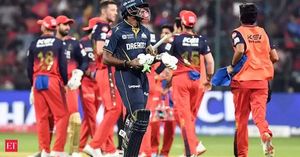MANASSAS PARK, VA — The murder trial of Naresh Bhatt, charged with killing his missing wife, Mamta Kafle Bhatt, is set to begin on September 8, 2025, following significant developments in the case. His charges now include first-degree murder and the defiling of a dead body, adding serious weight to the accusations he faces.
Naresh, 37, has been embroiled in legal turmoil since his wife, who was last seen at work on July 27, 2024, disappeared. She worked as a nurse at UVA Health Prince William Medical Center. Police were initially alerted to her absence by friends who hadn’t heard from her, prompting them to conduct welfare checks. After multiple days, it was Naresh himself who reported her missing on August 5, claiming he last saw her on July 31.
Mamta's case is surrounded by mystery and tragedy as her body remains unaccounted for, leading investigators and authorities to suspect foul play. According to court documents, her family believes she was murdered, and evidence has begun to materialize supporting this hypothesis. Surveillance footage reportedly captured Naresh discarding trash bags at various locations — items authorities suspect could be linked to the case.
At Naresh’s initial arrest shortly after Mamta was reported missing, he was charged with concealing her dead body. Yet, the prosecution's pursuit of murder charges did not commence until recently, signaling the case's potential for complexity as it escalated through the legal system. Evidence shared with the grand jury pointed to potentially grisly details — including blood traces found within their home and indications of violent altercations.
Recent reports indicated blood was discovered not only around the couple’s living space, but specific areas suggested the possibility of dismemberment, leading to charges of defiling Mamta’s body. This is indicative not only of the physical evidence but suggests investigators aim to showcase the circumstances surrounding her disappearance as part of the prosecution's narrative during the trial.
The couple’s one-year-old daughter was placed under the care of social services and has since been reunited with Mamta's family, who had to navigate their own challenges following the incident's fallout, including taking emergency measures to come from Nepal to support their kin.
The trial is expected to draw significant public attention, partly due to the severity of the charges but also the unique nature of the case — the disappearance of Mamta and the absence of her body complicates prosecutorial strategies. Legal experts note how historically challenging murder charges can be without the victim's remains; nevertheless, Naresh's case could benefit from advanced forensic methods and evidence such as DNA, cellphone data, and heightened surveillance technology, which increasingly plays a pivotal role in contemporary legal proceedings.
During the most recent court hearings, Naresh appeared unyielding, even reportedly shaking his head as charges were reiterated before the judge. This scene added tension to the atmosphere, with Mamta’s supporters expressing their distress over the hearings and the broader impact on the family. Some advocates and supporters of Mamta have taken it upon themselves to attend every court date, demonstrating solidarity with her family.
Notably, several requests have been made for the trial proceedings to be broadcast on Court TV — which has drawn mixed sentiments from family supporters. While some perceive transparency as beneficial, others feel the trauma of the ordeal shouldn't be subject to public spectacle, especially concerning the sensitive nature of the family’s grief.
Judge Kimberly Irving presided over the latest hearing, during which Naresh waived his right to a speedy trial. Legal motions and deliberations come as the expected four-week trial date inches closer, raising hopes for breakthroughs or closure as the community remains invested in the outcome. The judge has yet to rule on the courtroom broadcasting arrangements but will weigh the opinions of both the prosecution, the defense, and concerned family members.
The state of Virginia has garnered attention for intriguing cases relative to missing persons and murder trials, but Naresh Bhatt’s case has struck particularly deep local cords — drawing attention from outside the commonwealth, including media from Nepal.
Supporters of Mamta are rightfully eager for answers. “I think it’s important for the truth to come out,” said Angel Rodas, who has become one of Mamta’s staunch advocates, pushing for justice all the way through the legal process. The community awaits what follows as evidence, testimonies, and trial revelations are anticipated to shape the narrative and outcomes surrounding Mamta's tragic disappearance and presumed murder.
With Daresh Bhatt now facing the colossal challenge of defending against murder charges, the forthcoming trial will likely reveal more about the circumstances of his wife’s disappearance, offering both family and community members the promise of answers long sought.
This trial poses not just the pursuit of justice for Mamta Kafle Bhatt; it's also about confronting the emotional distress endured by her family and community. The local scene remains abuzz with the prospect of the trial, as many hope it will shine light on the chilling details yet to fully unfurl. The court kicks off proceedings next September, where many will be watching closely.



